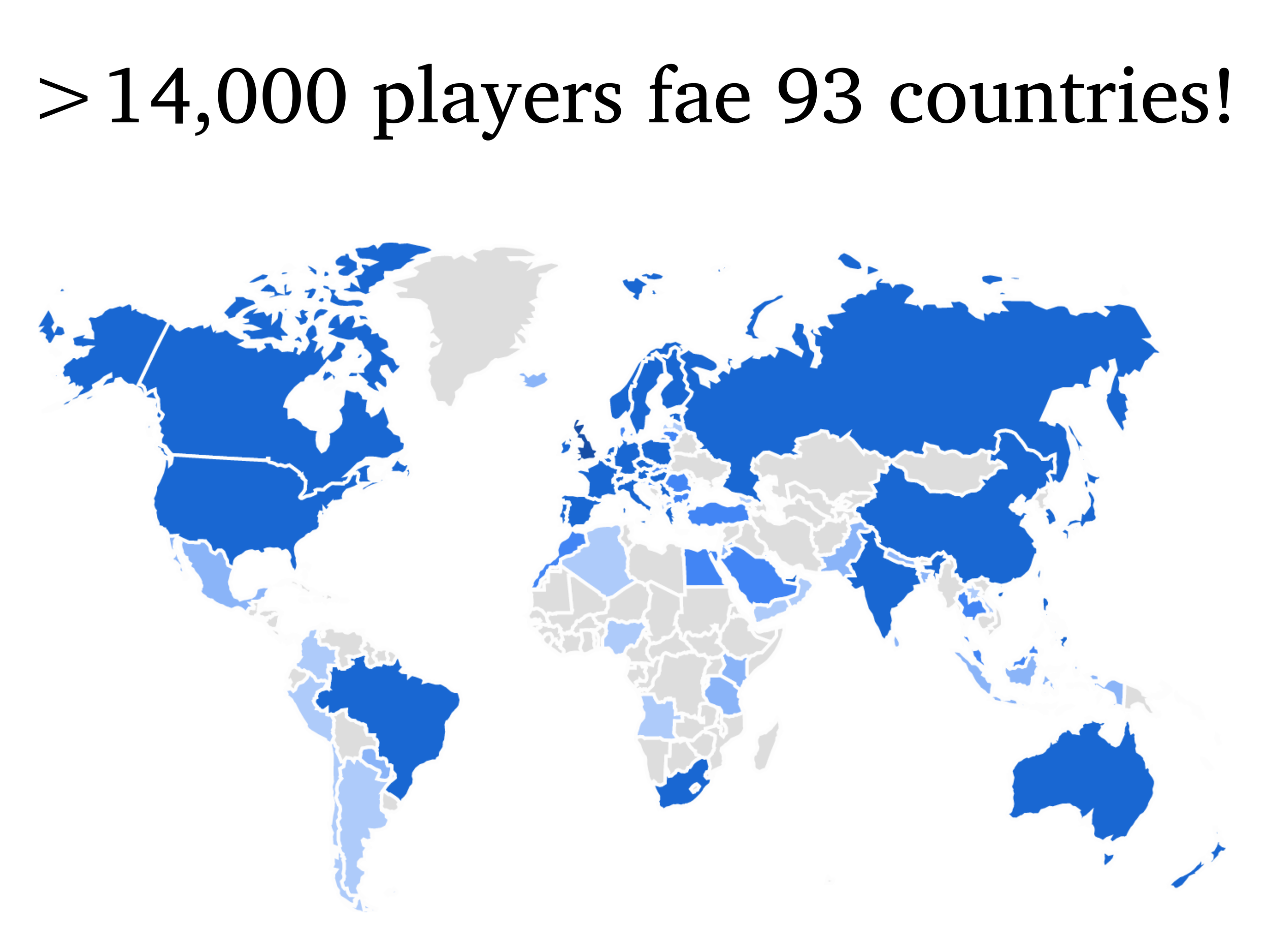Wirdle solutions week 13
We're pleased to announce that as of today the Shaetlan Wirdle has had more than 13,000 players from 93 countries. Here are the solutions for this week! Scroll for one word at a time to get the correct answer, it's meaning, and the history of the word. Last you'll find the main references we use for the etymologies, and the latest map of players. You'll find the principles of our spelling system at https://www.iheardee.com/english/spelling-in-shaetlan (or in our linktree).
✅
It's important to remember that "Old English" was never a monolithic language, but rather is a cover term for four distinct North Sea Germanic varieties. The direct ancestor of Scots was Northumbrian Old English. The direct ancestor of English was Mercian Old English. But most of the existing data comes from West Saxon Old English. Wherever possible we have given the Northumbrian Old English forms, since the main ancestors of Shaetlan are Norn and Scots (not English), with a lot of Dutch/Low German influence.
✅
With thanks again to Julie for hatching the idea and to Andrew for making it possible! 🤗
snush ‘to sniff, snort’
History: this word is Orkney ad Shetland specific. The origin of the Scandinavian cognates (No. & Da. snuse, Sw. snusa ‘to sniff’) is probably from Low Germanic (cf. Old Dutch snoesen) so this could be a Hansa loan. The ultimate origin is the Proto-Germanic *snūtaz ‘snout’.
rodds plural of rodd ‘road’
History: the Old Scots rod(d) ‘path, track, road’ is attested from 1231. The origin is uncertain, but might ultimately have the same origin as Old Scots rade ‘a foray’ which descends from Old English raad, raat ‘journey, ride; raid, expedition’. This in turn descend from Proto-Germanic *raidō ‘ride, journey’ which ultimately comes from Proto-Indo-European *Hreydʰ- ‘to journey, be in motion’. The semantic development from ‘journey, ride’ to ‘track, way, road’ is a bit of a mystery.
steek ‘connecting stitch; to shut, (en)close, block’
History: the Old Scots steik ‘to stitch’ is attested from 1502 and descends from (N) Old English stice ‘a stitch’, which itself comes from Proto-Germanic *stikiz ‘a sticking, a prick’ and ultimately from Proto-Indo-European *(s)teyg- ‘to be sharp, to sting’. The Old Scots verb steke ‘to block, obstruct’ (attested from 1375) is a bit of a mystery. It might have the same origin as stick, from Old English sticca ‘rod, twig’ (ultimately from the same Proto-Indo-European root), with an original notion of thrusting a door-bolt through a staple or something like that.
mesel ‘myself’ (1st singular reflexive pronoun)
History: reflexive pronouns indicate an entity which is identical with something that has already been mentioned in the sentence. Shaetlan has two types of reflexive pronouns, an emphatic one, which is a compound of me + self for the first person singular, and an unstressed one, which is simply me for the first person singular. The northern and Scots forms reflect the original OE mē se(o)lf, which was then later reanalysed to my+self in the southern varieties in Middle English.
saets plural of saet ‘seat’
History: this is an early loan from the Old Norse sǽti ‘seat’. Old Scots had seit(t), seytte, sa(i)t(t)(e). The word ultimately comes from Proto-Germanic *sǣtia- ‘seat’, which in turn comes from Proto-Indo-European *sēd-i̯o-, a nominal derivation of *sed- ‘to sit’.
bruck ‘rubbish’
History: the Old Scots bro(a)k ‘broken or small pieces, fragments’ is attested from 1538 and derives from Old English broc ‘misery’, gebroc ‘fragment’, which are nominal derivations of brecan ‘to break’. That in turn comes from Proto-Germanic *brekaną ‘to break’, ultimately from Proto-Indo-European *bʰreg- ‘break’.
wirry ‘to worry; choke’
History: the Old Scots wery is attested from 1400 with the meaning ‘to strangle’ and from 1420 with the meaning ‘to be choked’. It descends from Old English wyrgan ‘to strangle, worry, kill by violence’, which comes from Proto-Germanic *wurgjan meaning the same. It ultimately goes back to Proto-Indo-European *wergh- ‘bind, squeeze’. The form worry (with a back rounded o-or u-sound) is a later development in English starting in the 1500s.
References
Bokmålsordboka. 2022. Språkrådet og Universitetet i Bergen. Available at http://ordbøkene.no.
Christie-Johnston, Alastair & Adaline Christie-Johnston. 2014. Shetland words. A dictionary of the Shetland dialect. Lerwick: The Shetland Times.
de Vaan, Michiel. 2008. Etymological dictionary of Latin and the other Italic languages. Leiden, Boston: Brill
de Vries, Jan. 1977. Altnordisches etymologisches Wörterbuch. Leiden: Brill.
DSL Online. 2002. Glasgow: The University of Glasgow. Available at https://dsl.ac.uk/.
Heggestad, Leiv, Finn Hødnebø & Erik Simensen. 1993. Norrøn ordbok. 4th edn of Gamalnorsk ordbok. Oslo: Det norske samlaget.
Hellquist, Elof. 1993. Svensk etymologisk ordbok. 3rd edn. 2 Vols. Malmö: Gleerups.
Jakobsen, Jakob. 1985 [1928]. An etymological dictionary of the Norn language in Shetland. Lerwick: The Shetland Times.
Kroonen, Guus. 2013. Etymological dictionary of Proto-Germanic. Leiden: Brill.
Lehmann, Winfred P. 1986. A Gothic etymological dictionary. Leiden: Brill.
Macbain, Alexander. 1911. An etymological dictionary of the Gaelic language. Stirling: Eneas Mackay.
Marwick, Hugh. 1929. The Orkney Norn. Oxford: Oxford University Press.
Matasović, Ranko. 2009. Etymological dictionary of Proto-Celtic. Leiden: Brill.
Nielsen, Niels Åge. 1995. Dansk etymologisk ordbog. Ordenes historie. 4th edn. København: Gyldendal.
Nynorskordboka. 2022. Språkrådet og Universitetet i Bergen. Available at http://ordbøkene.no.
OED Online. 2021. Oxford: Oxford University Press. Available at https://www-oed-com.ezproxy.uni-giessen.de.
Orel, Vladimir. 2003. A handbook of Germanic etymology. Leiden: Brill.
Pfeifer, Wolfgang (ed.). 1997. Etymologisches Wörterbuch des Deutschen. München: Deutscher Taschenbuch Verlag.
Pokorny, Julius. 1994. Indogermanisches etymologisches Wörterbuch. 3rd edn. 2 Vols. Tübingen: Francke Verlag.
Torp, Alf. 1919. Nynorsk etymologisk ordbok. Kristiania: Forlaget H. Aschehoug & Co.
Zoëga, Geir T. 1896. English-Icelandic dictionary. Reykjavík: Sigurður Kristjánsson.
Zoëga, Geir T. 1922. Icelandic-English dictionary. 2nd edn, enlarged. Reykjavík: Sigurður Kristjánsson.

